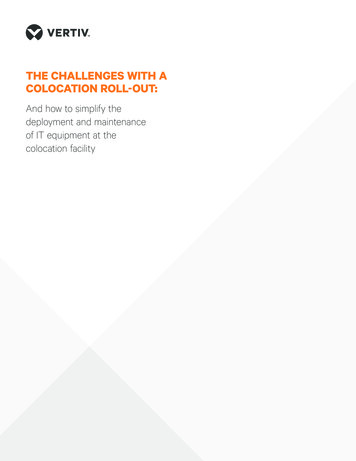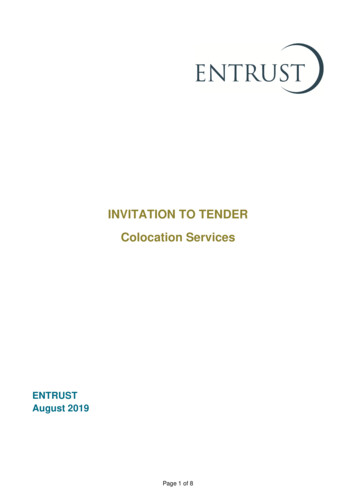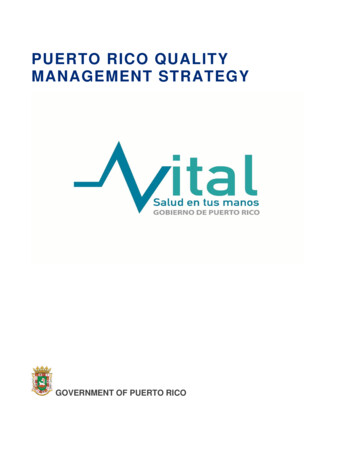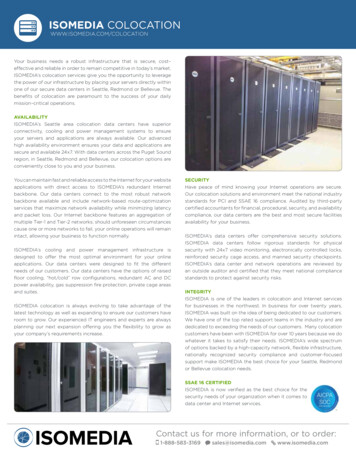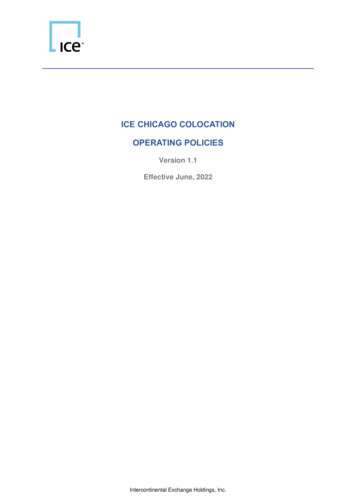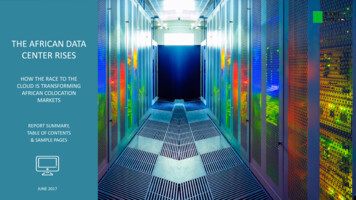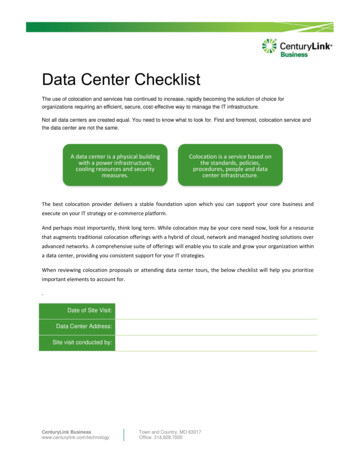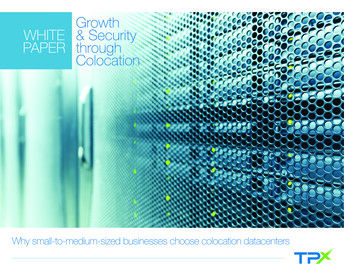
Transcription
Growth& SecuritythroughColocationWhy small-to-medium-sized businesses choose colocation datacenters
PARTICULARLY FORFINANCIAL SERVICESBUSINESSES AND COMPANIESIN HEALTHCARE, A SECUREAND ROBUST DATACENTERSTRATEGY AND PLAN IS AMUST TO MEET COMPLIANCEREGULATIONS. HOWEVER,ANY COMPANY THATPERFORMS A SIGNIFICANTAMOUNT OF BUSINESSUSING CENTRALIZED DATACAN BENEFIT THROUGHCOLOCATION.THE CASE FORCOLOCATIONDRIVERS FOR COLOCATION:VIRTUALIZATION & COMPLIANCEMore businesses than ever are taking advantage of colocationfor their enterprise technology and applications. Theychoose colocation for redundancy or for security and loweroperating expenses with primary business infrastructure. Thisrepresents more than just a trend; it’s a fundamental shift. Infact, datacenter colocation services are forecast to grow at aCAGR of 13.2% from 2010-2014, according to a study fromMarketResearch.com.The rise of virtualization and cloud services is driving the need formore datacenter services. IBM’s 2011 CIO Study of more than3,000 global CIOs revealed that 60 percent of organizations areready to embrace cloud computing during the next five years asa means of growing their businesses and achieving competitiveadvantage. This is nearly double the number of CIOs who saidthey would utilize cloud computing in IBM’s 2009 CIO study.Yet at the same time, many small to medium businesseshave evaluated colocation only to put off the decision or tokeep doing things the same way as yesterday. This documentis intended to challenge the assumptions of yesterday andencourage IT professionals to reconsider their current strategyof using on-premise installations.There are a number of reasons that businesses have electedto undertake colocation. On the growth side, companiesface a massive proliferation of data, have widely-distributedand mobile workforces needing real time access to data,and are continually virtualizing servers, applications and data,demanding more from the network and requiring scalablebandwidth.At the same time, companies must meet compliance andgovernance rules and ensure that business continuity isseamless in the event of a disaster or disruption. Also,building a datacenter is a pricey endeavor and a capitalexpense, whereas colocation is an operating expense thatis often bundled with significant savings on bandwidth.Today, colocation is available at historic low prices, thanks toincreased capacity and lower telecom and network costs.Colocation offers the most reliable, redundant, secure and costeffective means of delivering virtualized and cloud computingservices. At the same time, colocation is essential for companiesthat must meet compliance regulations.Virtualization tasks the networkVirtualization and cloud computing depend on network servicesthat are fast and reliable. But they also require the environmentalcontrols that datacenters provide. Power and performance ofthe network is key in the virtualized environment, and hardwarewith virtualized servers requires the optimal environmentalsupport that colocation datacenters provide.Colocation supplies flexible bandwidth, fast connections androbust power to support the network, providing reliable servicefor virtual machines and cloud-based services. As servervirtualization reduces the amount of physical servers needed,the consolidated servers emit greater heat, which must bequickly removed for optimal daily functionality—and equipmentlongevity. Virtualization is excellent at reducing the capitalexpenditure of buying more servers. But the servers runningmultiple virtual machines won’t function as efficiently or last aslong if they are not environmentally conditioned.
COLOCATION CAN HELPSMALL-TO-MEDIUM SIZEDBUSINESSES ( 500M ORLESS) THAT:nARE MOVING TO MORECOMPLEX IT SYSTEMSnMUST MEET COMPLIANCEREGULATIONSnRELY ON INFORMATIONSYSTEMS THAT MUSTALWAYS BE AVAILABLEnHAVE AN ONLINE PRESENCEnOFFER HOSTED SAASAPPLICATIONSnDEAL WITH PRIVACYISSUES. THESE COMPANIESHAVE A DUTY TO PROTECTDATA, AND IN FACT, MUSTMEET GOVERNANCE ANDCOMPLIANCE STANDARDSnARE LOCATED IN AREASTHAT ARE DISASTER-PRONEOR HAVE POOR POWERSTABILITY OR QUALITYnARE POSITIONINGTHEMSELVES FOR RAPIDGROWTH AND NEEDFLEXIBILITY AND COSTSAVINGSCompliance requires colocationOTHER COLOCATION DRIVERSFor businesses that must meet compliance or governmentalregulations, especially those in financial services and healthcare,it’s too cumbersome and expensive to build and operatea datacenter. The required physical building and securityframework for compliant infrastructure requires an SSAE16 compliant datacenter. SSAE 16, which replaced SAS 70certification, is a rigorous certification process that ensuresthat the datacenter is able to meet the demands of companiesin financial services, healthcare and other industries subjectto stringent security and regulatory compliance. SSAE 16provides the additional assurance of routine, in-depth auditsof the datacenter’s controls and processes — including theservices provided by the datacenter operators. For all but thelargest companies, meeting this level of compliance can only beachieved through a colocated datacenter.Workplace mobility continues to increaseWith workplace mobility continually on the rise, the “alwayson” access for remote workers to data and applications isessential. Workers expect to access the network and itsbackend applications and data wherever they have Internetaccess, whether from home, remote offices or on theroad. Colocating the datacenter ensures that the networkexperiences maximum uptime, even in the event of a disaster.The backup power for colocated datacenters is structured tolast for days.Additionally, colocated datacenters have remote hands servicefor physical access to the network and hardware when IT staffis minutes or hours away.
The proliferation of datarequires better bandwidthFOR MOSTENTERPRISES,ADDING ACOLOCATEDDATACENTER ISSIGNIFICANTLYEASIER THANCREATING APRIMARY SITEFROM SCRATCH.John Edwards“Grow your Datacenterwith Colocation”ComputerworldMagazineJuly 11, 2011As enterprises grow and the proliferation of data expands,the need for greater bandwidth and speed emerges, andcompanies are faced with the choice of undertaking expensiveon-premise bandwidth installations that must be redundant.Otherwise, the network becomes bogged down, slowingproductivity and performance.Using a colocation facility gives businesses the opportunity toaccess voice and data bandwidth at substantially lower prices.Through colocation, businesses of all sizes can find access tothe bandwidth they need, including voice, MPLS, VPLS, EPLand Internet services via redundant and diverse fiber. Manydatacenters offer services that range from Ethernet to GigabitEthernet to multiple T1s and DS3s.Cost savings and moving capitalexpenses to the operating budgetAs businesses grow, they must decide whether to continue tohost servers in-house or colocate primary or redundant serversto a datacenter. Building a datacenter is prohibitively expensivefor all but the largest companies, and requires a large capitalexpenditure. John Edwards, a writer for ComputerworldMagazine, wrote in his July 2011 article “Grow your Datacenterwith Colocation” that, “For most enterprises, adding acolocated datacenter is usually a significantly easier task thancreating a primary site from scratch.”Not only does the colocation cost come from the operatingbudget, but colocation also offers expense reductions in theform of newly-available office space, reduced in-office utilitycosts and higher staff availability for more important corebusiness functions. This is where the cost savings actuallymanifests itself as a value-added benefit. Darren Mann,managing director of Equinix Australia, remarked in a 2011Computerworld Magazine Australia article, “Outsourcing to acolocation provider also has the added benefit of leaving thefacility-based services to those whose core business is buildingand running datacenters, allowing companies to concentrateon their own business.”Colocation delivers risk mitigationand disaster avoidance and recoveryWhile there is a perception that colocation is expensive, thetruth is that NOT choosing colocation can be even moreexpensive. In fact, many companies that suffer server damageor theft, or significant down time, find themselves quickly outof business. Particularly in a state prone to natural disasters —such as California with its fires, floods and earthquakes — it’svital to have a disaster avoidance and recovery plan. For that,colocation is essential.Today, smaller companies can enjoy professional datacenterfacilities and their benefits that, in years past, only large, wellheeled companies could afford. The cost avoidance of avertingeven one power outage and the often days-long process ofrebuilding servers and bringing up applications can alone coverthe cost of a year of colocation.Colocation removes risk from the enterprise by placing thecompany’s core IT assets in a protected, professionallymaintained environment specifically designed and staffedto house, operate and maintain servers, applications andnetworks. This is important to recognize, because, as MichaelKaspar, Colocation Subject Matter Expert for TPx, states, “theequipment and the technologies that are being developedand manufactured today are really intended to be put in acontrolled environment.” Mr. Kaspar further explains that
OUTSOURCING TOA COLOCATIONPROVIDER (LEAVES)THE FACILITYBASED SERVICESTO THOSE WHOSECORE BUSINESSIS BUILDING2016AND RUNNINGDATACENTERSDarren MannManaging Director,Equinix Australiain ComputerworldMagazine Australia“businesses have the highest dependence on access to theirtechnology and business critical data. To risk placing the lifelineof a business outside of a colocation facility jeopardizes thebusiness itself.”Countless studies address business recovery issues followingman-made or natural disasters. For businesses that havenot taken measures to protect their corporate data, theconsequences are generally dire. Consider these conclusions:When an outage strikes, the cost begins the moment thepower fails, and spirals up after that. A 2011 article in DisasterRecovery Journal states: “The longer a disaster disruptscommunications, the more critical the impact. In the first houralone, it is estimated that more than 80 percent of the financialinstitutions would lose nearly 1,000 per hour; an additional10 percent of the surveyed financial institutions claimed lossesof more than 100,000 per hour. A University of Texas studyfound that 85 percent of businesses are totally or heavilydependent on information systems to stay in business, andthat a loss of those systems would cost companies up to40 percent of their daily revenues.”1. “One out of two businesses never returns to themarketplace following a major disaster. Of those that do, halfgo bankrupt within three years. The ones that survive plantheir response to a disaster before it strikes” (Chubb Groupof Insurance Companies).201720182. “Ninety percent of companies that experience data loss goout of business within two years” (Gartner).3. “Within two years after Hurricane Andrew struck in 1992, 80percent of the affected companies that lacked a businesscontinuity plan failed” (FEMA).4. “Companies that aren’t able to resume operations withinten days of a disaster are not likely to survive.” (StrategicResearch Institute)2019Most metropolitan areas experience power outages during anygiven year that typically won’t affect colocation datacentersbecause of their built-in power redundancy. Power outagespresent a number of risks — damage from spikes and surges,the shutdown of vital systems, and backup power runningout. Recently, a number of high profile disasters from floods tostorms to large city power outages have put businesses offlinefor hours and sometimes days. Customers with colocationmay avoid these outages entirely, enabling business tocontinue, thereby avoiding the thousands or tens of thousandsof dollars in IT services that are needed to bring servers,applications and networks back up and running. Businesscan attempt to protect themselves with generators, but theseare highly cost-prohibitive. Battery backup/UPS systems willexhaust in minutes.20202021Further studies indicate that colocating in a dedicated andsecure datacenter is a formative measure toward avoidingbecoming another statistic.Colocation positions companies for growthBusinesses have had to be more money savvy than everduring the past decade. As businesses balance decisionsrelated to growth, they can rely on colocation to deliverflexibility by deferring or avoiding capital purchases, offeringthe best combination of bandwidth options, and refocusingemployees on more value-added, core company work. Thebuy-what you-need model is perfectly suited for companieswho need to scale quickly.
90% OFCOMPANIES THATEXPERIENCE DATALOSS GO OUT OFBUSINESS WITHINTWO YEARS.2016GartnerColocation is more secureA QUESTION OF WHY NOT?For many businesses, keeping a server down the hall is likeleaving their wallet on the desk. While they don’t think that yourcolleagues or customers would take it, the fact is, they aretaking a tremendous and unnecessary risk. Businesses havegone out of business due to fire, flood, negligence and theft.Other incidents cause millions of dollars to mitigate and leavea legacy of bad PR and recurring headaches. All one needs todo is turn on the news during the past 60 days to see the largeand small companies suffering data loss due to theft or naturaldisasters. No company is exempt from the potential maliciousintrusion of their data systems.Today’s fast-paced business environment, distributedworkforces are increasingly reliant on access to corporatedata and applications. At the same time, the very nature ofvirtualization, SaaS and cloud systems make data and systemavailability an absolute imperative.It doesn’t just happen to big firms. Healthcareinfosecurity.comreported in 2010 that thieves broke into offices of a Californiabased optometry practice and, despite the presence of alarms andcameras, stole equipment including a server with 40,000 patientrecords that held vital data including social security numbers.Businesses that process significant volumes of credit cardtransactions should seek higher levels of security fromcolocation providers, and look for intelligent routing, networkmonitoring and reporting, and constant, updated firewallsupport and Intrusion Protection (IDS/IPS).Colocation facilities are staffed by professionals who’veundergone background checks. Not only are these facilitiesdesigned to meet the environmental needs of the equipment,but they are also designed to be secure, complete with24x7x365 security staff and access systems that may includecard access, double-authentication systems or biometricsecurity. Video surveillance both inside and outside colocationfacilities is standard.The rise of colocation in datacenters today represents anopportunity for small-to-medium sized businesses to evaluatehow they currently connect to the Internet or their privatenetworks and whether or not they can mitigate risk and savemoney through the strategic use of colocation also givesbusinesses the opportunity to flexibly scale without the addedcost of building and operating their own datacenters.When faced with the decision to maintain the core of the businessin an unsuitable environment, or invest millions building anexpensive datacenter, colocation, with its secure environment anddedicated staff, becomes the compelling and economical choice.CITATIONSNew Global IBM Study Confirms Cloud Computing Poisedto Take Off at CompaniesDisaster Recovery for BusinessFrank Ianna, Disaster Recovery Journal, 2011Burglars Steal Server at ClinicHoward Anderson, Executive Editor,HealthcareInfoSecurity.com, May 19, 2010Grow Your Datacenter with ColocationJohn Edwards, July 11, 2011Choosing the Right Colocation ProviderKate McDonald, Computerworld Australia, Sept. 9, 2011
COLOCATION OFFERS THEFOLLOWING BENEFITS:nABILITY FOR THECUSTOMER TO INSTALLTHEIR EQUIPMENT IN ASECURE FACILITY THATIS ENVIRONMENTALLYCONDITIONED FORMISSION-CRITICALSERVERSnELIMINATES THE NEED FORCUSTOMERS TO BUILDAND MAINTAIN THEIR OWNINFRASTRUCTURE, MOVINGCAPITAL EXPENSES TOOPERATING EXPENSESnFACILITATES GROWTH BYENABLING CUSTOMERS TOPAY FOR WHAT THEY NEEDAND SCALE THE SERVICES/BANDWIDTH AS THEIRBUSINESS DEMANDSnALLOWS ACCESSTO HIGH CAPACITY,MULTI-THREADED ANDREDUNDANT BANDWIDTH,OFTEN AT A DISCOUNTMEET GOVERNANCE ANDCOMPLIANCE STANDARDSABOUT TPXTPx is the premier managed services carrier that deliverscomprehensive communications solutions to 75,000 businesslocations nationwide. Businesses nationwide trust TPx tomanage their mission-critical network services. TPx’s awardwinning, enterprise-grade unified communications, managedIT, and network connectivity services empower companies tounleash productivity by streamlining processes, proactivelymonitoring systems, and staying current with rapidly-changingtechnology. TPx backs its services with a zealous commitmentto Customer Care, including a network uptime guarantee and24/7/365 live-answer technical support.Ready to move your business communicationsto the cloud? Call us at 800-399-4925.tpx.com
vital to have a disaster avoidance and recovery plan. For that, colocation is essential. Today, smaller companies can enjoy professional datacenter facilities and their benefits that, in years past, only large, well-heeled companies could afford. The cost avoidance of averting even one power outage and the often days-long process of
